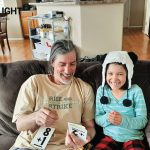Have you ever watched your children say "I'm sorry" when they clearly don't mean it?
I just spent a wonderful week with my children and grandchildren, and the idea of family and forgiveness is on my mind. We had the opportunity to see some of these situations play out before our eyes as young siblings and cousins had to deal with hurts—some accidental, some intentional.
Even with people whom we love dearly and genuinely enjoy, relationships are not neat and tidy. We're often caught in situations where we end up hurting others and/or being hurt ourselves. So what do we do?
Among many things, we need to seek forgiveness ... and not just spin off a quick "I'm sorry" that fails to take responsibility for whatever real wrong we did. (After all, the people we hurt are usually sorry, too, that we have hurt them!) The question is not, Am I sorry? The question is, Am I willing to own up to my fault? I have come to the conclusion that even when I am convinced the other person is 99% in the wrong, I need to seek to understand and recognize the 1% responsibility that I share in the bad situation. If I'm convinced I have absolutely no role in an interpersonal problem, how can I become part of the solution?
I'm so grateful that John has modeled this concept in our family, and especially our marriage. I seek to live it out as well.
In our marriage (and in all my relationships), when I recognize my role, acknowledge it and ask for forgiveness, I crack open the doors for reconciliation. Even if I cannot see my contribution to the problem, I must at least ask the question "How can I be made right with you?"
Now, this doesn't mean I have to take all the blame and make excuses for the person who hurt me. If I truly only have a small part in the problem, I take responsibility for that part. I don't burden myself by taking responsibility for what I had no part in. Then I seek to move forward with the other person.
One important caveat: If you are in an abusive situation, please don't give in to the temptation to take blame and responsibility where you have none. Seek the help you need and protect yourself and your family.
But in less extreme situations, this difficult self-searching and acceptance of responsibility can go a long way on the road to healing.
As I continue to spend time with family this season, I will strive to not let interpersonal difficulties go unacknowledged. I will strive to accept responsibility for my contribution to problems and seek forgiveness and reconciliation when needed.
Please know that I hold the whole Sonlight community dear to my heart. John and I and the Sonlight staff pray for you and your family, your marriage and your relationships. May God guide you and deeply bless you in this holiday season.
Blessings to you and yours,
Sarita






